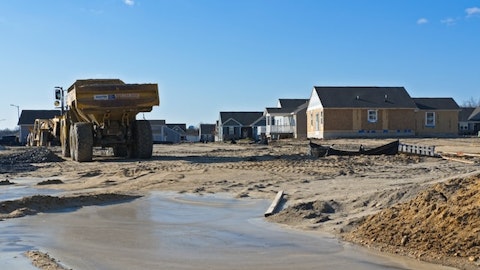Greg Palm: Yeah. That makes sense, won’t be a huge surprise. In terms of order rates coming through when they are ready, would you expect them at kind of similar levels as retail, has placed those orders post destocking or will there be any change in how the community REIT channel places orders versus what you have seen in retail over the last two quarters?
Bill Boor: I don’t think so. I think once they get cleared of the inventory that they are trying to work through, we talked with the street dealers on the concept of one-to-one, right? They sell a house, they need a house and I think we will see the same thing. And communities are a meaningful portion of the overall, we kind of in this discussion, I am grouping developers communities kind of as one package, but it’s a meaningful part of the overall demand. So we typically talk about that being 30%, 33% of the market and they haven’t been carrying the 33% or so of the current orders. So we will see it pick up once that continues to clear. I am not sure…
Greg Palm: Yeah.
Bill Boor: Did that address your question?
Greg Palm: Yeah. Yeah. Totally did. And I guess just lastly…
Bill Boor: Okay. Thanks.
Greg Palm: … I know you have kind of characterized this as kind of a challenging time and…
Bill Boor: Yeah.
Greg Palm: … Cavco as a company is fortunate, good balance sheet and all, and there’s a lot of operators out there that, probably, don’t have any backlog, they don’t have a good balance sheet. And so I am curious, does this change your appetite for M&A? Have you seen additional opportunities hit the pipeline? What’s just kind of your visibility level there?
Bill Boor: Yeah. I wouldn’t say it’s been a big impact right now as far as people being distressed and therefore having to look for alternatives on the manufacturing side as far as M&A work. We are always interested and always in kind of some stated discussion to stay connected with those folks. So I wouldn’t characterize that I have seen a lot of distress type situations. And I think really we have to look at it — you are right, if you lose your backlog that could be an issue, obviously. But pricing is held up, so I think margins through the industry are still more healthy than would be the case in a time when manufacturers are really on the verge of failing.
Greg Palm: Yeah. That’s a good point. Okay. I will leave it there. Best of luck.
Bill Boor: Thanks, Greg.
Allison Aden: Thanks.
Operator: One moment for our next question. Our next question comes from Jay McCanless with Wedbush. Your line is open.
Jay McCanless: Hey. Good afternoon, everyone. So, actually, Bill, I was going to ask you the pricing question, too. So it sounds like things were holding up. You haven’t had to be really aggressive on cutting price?
Bill Boor: Yeah. We haven’t seen. I mean, I would say, it’s been consistent over the last couple quarters where there are markets where you see a little bit of price competition, but it’s been a little bit and you see other market — markets, where it really hasn’t been a factor at all and you can see in, our average selling price that we reported has a lot in it with retail and mix and everything else. But you can see that prices just haven’t materially dropped. So we always say it’s a local business. So when we talk to all of our plants and kind of check in with how things are going, we hear slightly different stories from plant-to-plant and region-to-region. But where it’s been noticeable that there’s a little price competition, it hasn’t been very dramatic.
Jay McCanless: That’s good to hear. Could you talk about where chattel rates are now and what type of availability you think is out there in the market on the chattel side?
Mark Fusler: Yes. On the rate side right now, they have held pretty steady from last quarter, so they are still about 9% to 9.5%.
Bill Boor: Yeah. Availability is kind of consistent in that sense. So I think if you are — what Mark’s quoting is a pretty good credit score, good loan-to-value, we try to report that consistently in that sense. But I wouldn’t say that, if you have got the credit, I don’t think the availability has gone down.
Jay McCanless: My last question. So we have heard from one of your competitors that, there may be some people walking away from floor plan financing for street dealers. Can you talk about your appetite to maybe pick up some of that business, especially with having the sizable cash balance you do, even notwithstanding the buyback, still have a pretty healthy cash balance? Is that something where Cavco…
Bill Boor: Yeah.
Jay McCanless: … might want to go a little deeper?
Bill Boor: Yeah. I think we just kind of react to the situation for the most part. As you know, we have got a reasonably sizable portfolio of floor plan loans with our independent dealers. And I think as we have stayed very close — by virtue of having that, you stay very close to the credit situation out there. So, yeah, we absolutely would provide floor plan financing in the right situations. We wouldn’t shy away from it in this market.
Jay McCanless: Okay Great. That’s all I had. Thank you.
Bill Boor: Great. Thanks, Jay.
Operator: One moment for our next question. [Operator Instructions] Our next question comes from Michael Chapman with Aviance Capital Partners. Your line is open.
Michael Chapman: Thanks. A quick question on the revenue per module, been kind of flat like you mentioned for the last 25 [ph] quarters. If the developers are rolling off with — I am assuming they would be at more of kind of a wholesale margin. Do you think that kind of gets picked up by more wholesale or could that actually have some upward bias on your rev per module?
Bill Boor: You are saying, if — when we are working with developers, are we selling at wholesale price or retail?
Michael Chapman: Yeah. I mean, if…
Bill Boor: Is that kind of a question?
Michael Chapman: Yeah. If developers are moving out, I am assuming that they kind of get wholesale pricing. Is there any…
Bill Boor: Yeah.
Michael Chapman: … opportunity to get price increase just because you are going to have more retail?
Bill Boor: I am not sure I am following unfortunately. I think you are right that there would be kind of a distribution partner in the sense they would be getting wholesale price. So the extent that picks up, we will see a little bit of a shift within our consolidated financials to more wholesale pricing. And as we have tried to explain through time about our average selling price, our average selling price is affected by the proportion of wholesale pricing to retail pricing. So in that case, as communities and developers come up, I think, I am getting to your question, you would see wholesale take a bigger portion and you might see our reported average selling price drop a little bit, right?



